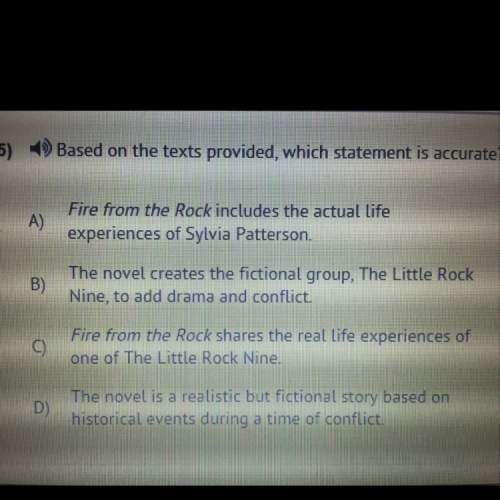
English, 26.06.2019 09:30 justabeachbum
In jane eyre by charlotte brontë, which statement best explains why jane admires helen? helen is the prettiest girl in school. helen is clean and orderly. helen fights for her rights. helen holds noble views. (gradpoint)

Answers: 1


Other questions on the subject: English

English, 22.06.2019 02:30, emely1139
Need the answer asap! read the sentence from the declaration of independence. which idea does this sentence best to develop ? that whenever any form of government becomes destructive of those ends, it is the right of the people to alter or abolish it, and to institute new government a) governments ultimately have the power to determine what rights the people have. b) revolting against the government should not be taken lightly. c) the colonists should seperate from great britain and create their own government. d) it is self evident that people have inalienable rights
Answers: 1

English, 22.06.2019 07:20, ahorseman
Read the passage below and answer the question. the old man was known for his probity. he was considered incorruptible. using context clues, how would you define the meaning of the word probity in the passage? curiosity drunkenness integrity corruptibility
Answers: 1

English, 22.06.2019 11:00, faithtaylor365
In me thou seest the twilight of such day, as after sunset fadeth in the west, which by and by black night doth take away, death's second self that seals up all in rest. —"sonnet 73," william shakespeare read the second quatrain of “sonnet 73,” and then answer the questions. what is the best paraphrase of these lines? what is the central idea of these lines?
Answers: 1

English, 22.06.2019 13:00, OnWheels
Ineed it now in this discussion you will use what you learned about the poems "will there really be a 'morning'? ", "i dwell in possibility", and "ozymandias" to compare how both dickinson and shelley used form - lines, capitalization, and punctuation - to bring meaning to the poems. let's check out one of your classmate's posts: in both "will there really be a 'morning'? " and "i dwell in possibility," emily dickinson capitalizes the words in the poem that tell the reader what to focus on in the poem. shelley also capitalizes words that are not names. these must be important to the meaning of the poem. create one post that compares how both dickinson and shelley use form - lines, capitalization, and punctuation - to bring meaning to the poems "will there really be a 'morning'? ", "i dwell in possibility", and "ozymandias".
Answers: 2
You know the right answer?
In jane eyre by charlotte brontë, which statement best explains why jane admires helen? helen is th...
Questions in other subjects:




English, 09.09.2021 15:40


Mathematics, 09.09.2021 15:40

Chemistry, 09.09.2021 15:40

Mathematics, 09.09.2021 15:40


Chemistry, 09.09.2021 15:40




